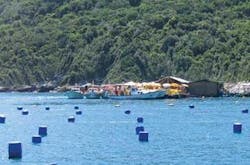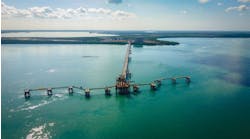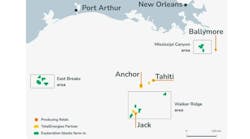Gene Kliewer • Houston
Shell explores community involvement in Brazil
Corporate citizenship is as relevant in the operations of international oil companies as any technical discipline. For example, there is Shell Brasil Ltda.’s community involvement centered around what is called the “indirect influence area” for the BC-10 project offshore Brazil. The area of influence stretches across two states, Espirito Santo and Rio de Janeiro, and includes 26 towns along the coast. The example described below and shown in the accompanying photograph is in Cabo Frio, about 100 km (62 mi) up the coast from the city of Rio de Janeiro.
In each instance, the project is determined in discussions with the people who will be involved. In Cabo Frio, 48 fishermen organized into an association in 2000 with the federal government’s assistance. In 2002, Shell Brazil got involved with the association. One result to date is that Shell helped the group acquire the necessary equipment, training, and permits to create a fish processing facility that sells its product to the local schools for lunchroom consumption.
This pilot program, which could be “exported” to other such associations of fishermen, appears to be succeeding. According to the local head of the fishermen, the participants have seen a 35% higher return for their fish since the project began buying and processing the catch for school consumption.
Proceeds from the operation are being used locally, too. At present, plans are under way to install an ice house at the processing facility to augment the two small freezers, for instance. The net return from the processing is marked for use in teaching boat repair and in the long-term, there are plans to buy sewing machines to manufacture tourist products.
StatoilHydro, Schlumberger R&D reaches the reservoir
StatoilHydro and Schlumberger Information Solutions have released the results of a two-year joint research and development program to optimize production.
The duo have developed and tested technologies and methods to optimize StatoilHydro’s Water Alternating Gas (WAG) process. Integrating Schlumberger technology optimized the process with respect to reservoir and surface constraints and commercial objectives. The resulting process incorporated real-time data and third party technologies to give a WAG schedule that can optimize production, Schlumberger says.
“The technologies and workflows developed through our collaboration on this initial project have the potential to allow optimization beyond WAG processes to control and optimize a number of production management systems,” says Astrid Jørgenvåg, vice president Research and Development, Increased Oil Recovery, StatoilHydro. “We are encouraged by work on the project thus far and look forward to promising results. Many of our fields use WAG processes to enhance recovery, and we expect material production increases from implementing similar work processes on other fields going forward.”
“This success represents a key milestone in achieving the ambitions of our collaboration with StatoilHydro. The joint pilot project delivers a material solution towards the realization of the digital oil field,” says Olivier Le Peuch, president, SIS.
Borehole seismic contracted for the North Sea
BP Exploration Operating Co. UK Ltd. has awarded READ Well Services Ltd. a three-year contract to provide borehole seismic services on the North Sea UK continental shelf. At the same time, READ signed to provide similar services to StatoilHydro on selected production platforms in the Norwegian sector over 27 months.
Ghana gets electromagnetic survey
Hess Corp. has awarded EMGS a $10-million contract to provide scanning and further delineation services to aid in the assessment of the hydrocarbon potential in Hess’ acreage offshore Ghana.
Pre-acquisition work is ongoing and the survey is expected to start immediately with follow on processing and interpretation services carried out in close cooperation with the client by EMGS in Houston.
Mississiippi Canyon data available
TGS-NOPEC Geophysical Co. has completed a new depth migration of 3D data from the Mississippi Canyon GoM OCS. The “Revival Kirchhoff” data volume was processed by TGS and designed to refine the velocity model using anisotropic parameter estimation and subsalt tomographic inversion.
“The Revival Kirchhoff volume was also calibrated with 247 wells provided by our Geological Products division,” says Zhiming Li, senior VP of Imaging Services at TGS. “The resulting model was then used to migrate the data using our proprietary 3D Anisotropic Kirchhoff Depth Migration algorithm to produce a 3D cube that accurately ties to well information and provides unprecedented quality beneath and around salt.”
Seismic vessel delivery scheduled
Singapore Technologies Marine Ltd. has signed a $20-million contract with Waveship AS to outfit the seismic vesselGeowave Voyager. Delivery of the 93 m (305 ft) x 22 m (72 ft) vessel is expected in the second half of 2008.
The contract includes installation of machinery, piping, electrical, accommodations, and modification and upgrading of the seismic equipment from six streamer capacity to 12 streamers. The helideck also will be extended.
Consortium to advance E&P education
BP Plc and Rice University in Houston agreed to establish along with selected other universities, a consortium to “advance technical learning and development in BP’s global exploration and production business.”
Rice will lead the group, which also includes Baylor College of Medicine’s Center for Collaborative and Interactive Technologies of Houston and Heriot-Watt University, Imperial College, and the University of Manchester of the UK.
BP says the consortium will support a worldwide program to promote knowledge transfer in the petrotechnical areas of subsurface geology, engineering, project management, and operations.




